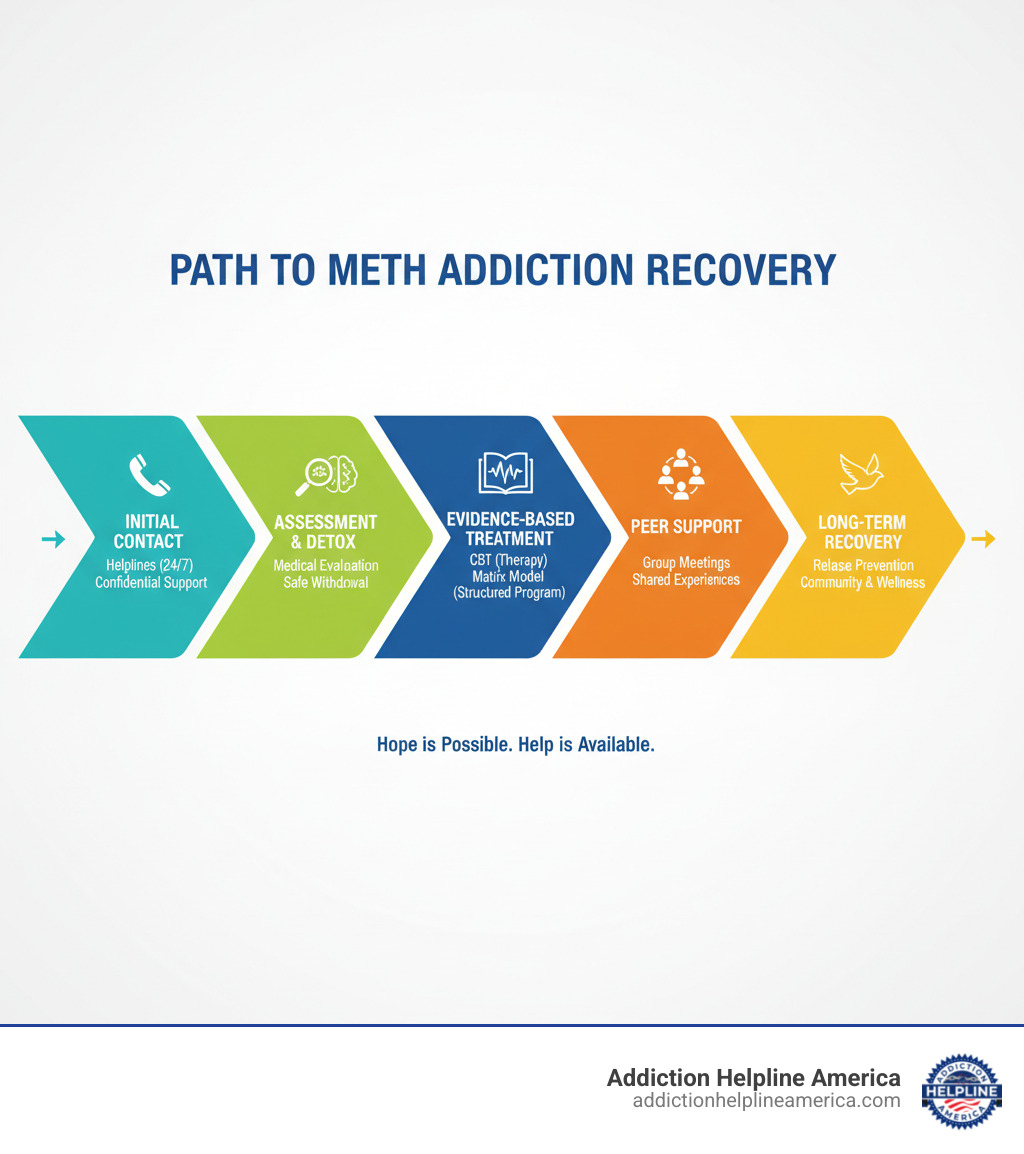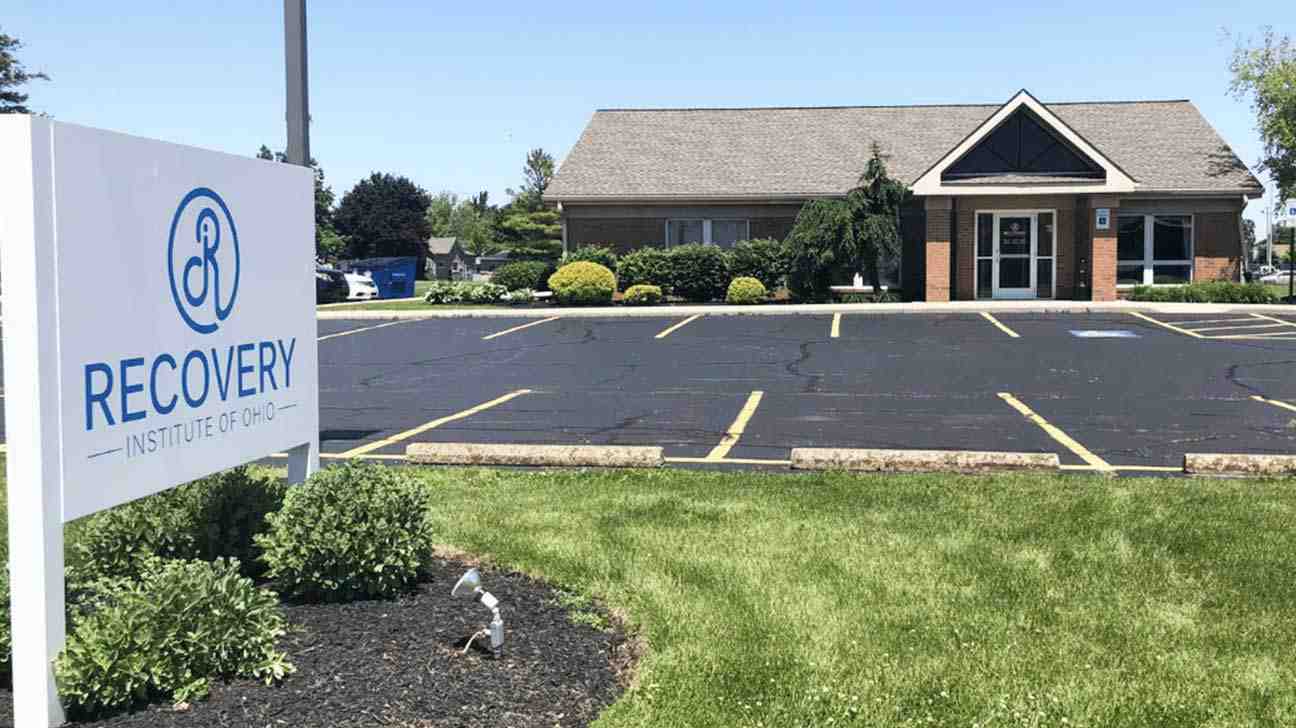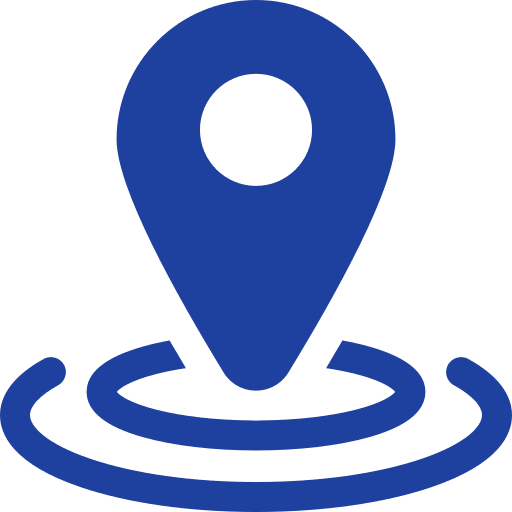
Understanding Your Path to Recovery
Meth addiction support is available through national helplines like SAMHSA (1-800-662-4357), evidence-based treatment, peer support groups, and comprehensive recovery services. Help is confidential, often free or covered by insurance, and accessible 24/7.
If you or a loved one is struggling with methamphetamine use, you are not alone. In 2021, about 2.7 million people in the U.S. had a methamphetamine use disorder, and over 16,000 deaths involved the drug.
Meth addiction feels overwhelming because it creates powerful brain changes that lead to compulsive use despite severe consequences. Users often fall into a “binge and crash” pattern, neglecting sleep, food, and responsibilities. Long-term use can cause severe dental problems, skin sores, heart damage, and changes to brain function.
But recovery is possible. While meth is hard to overcome, professional support dramatically improves the odds of lasting sobriety. Without it, studies show only 5% of users maintain sobriety after three years.
This guide will walk you through:
- Recognizing the signs of meth addiction
- Understanding treatment options
- Finding immediate help
- Supporting loved ones
- Building a life in recovery
At Addiction Helpline America, we connect individuals and families with compassionate, evidence-based meth addiction support. Our specialists provide 24/7 confidential guidance and treatment referrals custom to your unique needs. Whether you’re starting your recovery or supporting someone else, this guide offers actionable information to move forward with hope.

Quick look at meth addiction support:
Recognizing Meth Addiction: Signs, Symptoms, and Health Risks
Recognizing the signs of meth addiction is a vital first step toward getting help. While users often try to hide their substance use, there are clear physical, behavioral, and psychological signs that point to a problem.

Physical and Behavioral Signs of Meth Use
Methamphetamine is a powerful stimulant that causes noticeable changes. Look for these signs:
- Physical Changes: Sudden weight loss, constantly dilated pupils, and hyperactivity are common. Users may suffer from severe insomnia, going days without sleep. Poor hygiene, body odor, and skin sores from picking are also frequent. A key indicator is “meth mouth“—severe dental decay with cracked or blackened teeth.
- Behavioral Changes: You may notice erratic behavior, sudden mood swings, and paranoia. Individuals often become secretive, socially isolate themselves from loved ones, and begin neglecting responsibilities at work or home. This can lead to significant financial trouble as the addiction takes over.
Immediate and Long-Term Health Consequences
Meth use profoundly damages the body and mind, with both immediate and long-term effects.
Immediate Effects: A user feels a short-lived rush of energy and euphoria, but the drug also dangerously increases heart rate, blood pressure, and body temperature (hyperthermia). This often leads to a “binge-and-crash” cycle of repeated use to maintain the high.
Long-Term Consequences: Chronic use causes severe, often lasting, damage:
- Brain damage: Meth alters dopamine levels, leading to long-term problems with memory, coordination, and emotional regulation. It may also increase the risk of Parkinson’s disease. For details, see the Methamphetamine Research Report – Overview.
- Heart problems: The constant strain can cause heart attacks, strokes, and damaged blood vessels.
- Psychological disorders: Long-term use can trigger severe anxiety, intense paranoia, hallucinations (like feeling bugs under the skin), and delusions. Violent behavior and mood swings are also common.
- Malnutrition and skin lesions: Suppressed appetite leads to malnutrition, while constant skin picking causes sores and infections.
- Severe dental problems: “Meth mouth” results from dry mouth, teeth grinding, and poor hygiene, causing widespread tooth decay.
- Increased risk of infectious diseases: Sharing needles for injection dramatically increases the risk of HIV and hepatitis B and C.
These signs are a plea for help. If you recognize them, it’s time to explore meth addiction support.
Navigating Treatment: A Guide to Meth Addiction Support Programs
Recovery from meth addiction requires professional help. Proven treatment programs are available, and the best ones customize their approach to fit each person’s needs.

The First Step: Medically Supervised Detox
Recovery typically begins with detoxification. When you stop using meth, your body goes through withdrawal. Symptoms can include extreme fatigue, severe depression, anxiety, and intense cravings. While not usually life-threatening, these symptoms are so uncomfortable that they often lead to relapse.
Medically supervised detox provides a safe, drug-free environment where professionals monitor you 24/7. While there is no specific medication to reverse meth withdrawal, staff can manage symptoms like anxiety or insomnia to make you more comfortable. This professional support is crucial for getting through the difficult initial phase. If you’re ready, we can help you Find a detox center near you.
Core Treatment Modalities for Meth Addiction
After detox, therapy helps you understand the root causes of addiction and build a life without meth. This meth addiction support is offered in two main settings:
- Inpatient/Residential Treatment: You live at the facility for 30-90+ days, receiving intensive, full-time therapy. This is best for severe addiction or for those who need to escape a triggering environment.
- Outpatient Treatment: You live at home and attend therapy sessions several times a week. This works well for those with strong support systems and work or family obligations.
Several therapies are highly effective for meth addiction:
- Cognitive-Behavioral Therapy (CBT): Teaches you to recognize triggers and develop healthy coping skills to manage them.
- The Matrix Model: A 16-week comprehensive program combining individual and group therapy, family education, 12-step meetings, and drug testing to rebuild self-esteem and accountability.
- Contingency Management: Provides tangible rewards (like vouchers for healthy activities) for clean drug tests, retraining the brain to seek positive rewards.
- Individual and Group Counseling: Individual therapy offers a private space to address personal issues, while group therapy provides a sense of community and shared understanding.
Choosing the right program can be daunting. We can help you Explore different treatment programs to find the best fit.
The Role of Supportive Care in Meth Addiction Recovery
Currently, there is no FDA-approved medication specifically for meth addiction. Research is ongoing, but for now, treatment focuses on behavioral therapies.
However, medication plays a vital supportive role. Many people with meth addiction also have co-occurring mental health conditions like depression or anxiety. Treating these issues simultaneously is critical for recovery. Antidepressants, anti-anxiety medications, or antipsychotics can be prescribed to manage these co-occurring disorders, stabilizing your mental health so you can focus on addiction treatment. This integrated approach gives you the best chance at lasting recovery. To learn more about this topic, read about What is Medication Assisted Treatment.
Finding Help: Resources and Support for Individuals and Families
Recovery from meth addiction is possible with the right support. A wide range of resources is available for both individuals struggling with meth use and their families.
National Helplines and Treatment Locators
Immediate, confidential help is available through national helplines and online tools that can guide you to treatment options.
- SAMHSA’s National Helpline: Call 1-800-662-HELP (4357) for free, 24/7 confidential referrals to treatment centers and support groups. Services are available in English and Spanish.
- FindTreatment.gov: Use this anonymous online tool from SAMHSA to locate substance use and mental health treatment programs in your area. Visit FindTreatment.gov to begin.
- 988 Suicide & Crisis Lifeline: If you are experiencing a crisis or suicidal thoughts, call or text 988 for 24/7 free, confidential support.
- National Council on Alcoholism and Drug Dependence (NCAAD): Call 1-800-NCA-CALL (622-2255) for information and referrals.
Addiction Helpline America also provides a comprehensive List of addiction and rehab hotlines to simplify your search.
Peer Support Groups for Lasting Recovery
Peer support groups offer a unique form of meth addiction support by connecting you with people who have similar experiences. These groups provide a safe, judgment-free space to share stories and build a sense of community, which is crucial for overcoming the isolation of addiction.
Groups like Crystal Meth Anonymous (CMA) follow a 12-step model, while SMART Recovery uses tools based on cognitive-behavioral therapy. The power of shared experience in these community-based recovery meetings is validating and motivating. They are typically free and accessible, making them a vital part of long-term recovery and relapse prevention.
Support for Families and Loved Ones
Meth addiction affects the entire family, causing stress, anxiety, and helplessness. Support is available for loved ones, too.
Addiction can erode trust and communication. Family members may struggle with codependency or enabling behaviors. Family therapy can help heal relationships, improve communication, and set healthy boundaries. It educates families on addiction and how to best support recovery. The Counselor’s Family Education Manual offers valuable insights.
Support groups like Al-Anon or Nar-Anon provide a safe space for family members to share their experiences and learn coping strategies. They teach that while you cannot control a loved one’s addiction, you can manage its impact on your own life.
Overcoming Challenges and Building a Life in Recovery
Recovery from meth addiction is a journey with challenges. By addressing common barriers and building a supportive environment, a fulfilling life in recovery is entirely achievable.

Addressing Barriers to Meth Addiction Support
Several obstacles can prevent people from getting the meth addiction support they need. Understanding them is the first step to overcoming them.
- Stigma: The shame and fear of judgment surrounding addiction can keep people from seeking help. Addiction is a medical condition, not a moral failing.
- Financial concerns: Treatment costs can feel overwhelming. However, many centers accept insurance, and government-funded programs offer free or low-cost options. We can help you explore Paying for Addiction Treatment and verify your benefits.
- Co-occurring mental health disorders: Conditions like depression, anxiety, or PTSD often accompany addiction. Integrated treatment that addresses both issues simultaneously is far more effective.
- Lack of access to care: Living in a rural area or having transportation issues can be a real barrier. Our national network helps connect people to resources that fit their location and circumstances.
- Denial: A person with an addiction may not recognize the severity of their problem. It can take concerned loved ones or a professional intervention to help them see the need for change.
What Does Successful Recovery Look Like?
Successful recovery is more than just abstinence; it’s about rebuilding a life of purpose and joy.
- Improved health: As your body heals, you’ll notice better sleep, more energy, and clearer thinking. The constant anxiety and paranoia of meth use will fade.
- Rebuilding relationships: With time and consistent effort, broken trust can be repaired. Communication improves, and you can re-engage with family and friends in a healthy way.
- Finding purpose: Recovery is a chance to find new passions or refind old ones. Meaningful work, returning to school, or volunteering can provide a powerful sense of fulfillment. As one personal story of recovery from meth addiction shows, community contribution is transformative.
- Creating a relapse prevention plan: This is an essential roadmap for long-term success. It involves identifying triggers, developing coping skills, and knowing who to call for support. Our resources on Aftercare and Relapse Prevention can help you build this plan.
Recovery is a personal process built on hope, community, and self-respect. It is possible, and life on the other side is worth fighting for.
Frequently Asked Questions about Meth Addiction Support
Here are answers to some of the most common questions about methamphetamine addiction and recovery.
How long does meth stay in your system?
The detection window for methamphetamine depends on the test type, your metabolism, frequency of use, and other factors. General timeframes are:
- Urine tests: 1-4 days
- Blood tests: 1-3 days
- Saliva tests: 1-4 days
- Hair follicle tests: Up to 90 days
These are estimates, and individual results can vary. If you are concerned about a drug test, it may be a sign to seek meth addiction support.
Can you recover from meth addiction without professional help?
Quitting meth without professional support is extremely difficult and rarely successful. Statistics show that only about 5% of users maintain sobriety after three years without treatment. The relapse rate is incredibly high.
Meth rewires the brain, and withdrawal symptoms like severe depression, fatigue, and intense cravings are powerful. Professional treatment provides a safe detox, evidence-based therapies (like CBT), a structured environment, and relapse prevention planning. Attempting to quit alone often leads to a cycle of relapse and feelings of hopelessness. Professional guidance is the safest and most effective path to lasting recovery.
What is the first step to helping a loved one with meth addiction?
Watching a loved one struggle is painful. Here are the first steps you can take to help:
- Approach with concern, not judgment. Choose a calm moment and use “I” statements to express your worries (e.g., “I’m worried about your health”).
- Educate yourself. Understand that addiction is a medical condition. Learning about meth’s effects and the recovery process will help you offer compassionate, informed support.
- Research treatment options in advance. Have information ready about detox centers, rehab programs, and support groups. This shows you are offering a solution. Our guide on How to Get Into Rehab can help.
- Consider a professional intervention. If your loved one is in denial, an interventionist can facilitate a structured conversation to encourage them to accept help.
- Seek support for yourself. Family support groups (like Al-Anon) and counseling can help you cope with the stress and set healthy boundaries. Taking care of yourself is essential.
Conclusion
We’ve covered the challenging path of meth addiction, from its signs to the many avenues of meth addiction support. While the statistics can be daunting, recovery is absolutely possible. The human spirit is resilient, and hope is real.
Taking the first step is often the hardest but also the most courageous. It’s an acknowledgment that you’re ready for change. You do not have to face this alone. A strong network of support is ready to help, from medically supervised detox and effective therapies to the camaraderie of peer support groups.
At Addiction Helpline America, our mission is to offer free, confidential, and personalized guidance. We are here to connect you with the best treatment centers and support services nationwide that are custom to your unique situation. Your journey toward a healthier, substance-free life can begin today.
Our helpline is 100%
free & confidential
If you or someone you care about is struggling with drug or alcohol addiction, we can help you explore your recovery options. Don’t face this challenge alone—seek support from us.
Programs
Resources
Will my insurance
cover addiction
treatment?
We're ready to help
Find the best
drug or alcohol treatment
center
Are you or a loved one struggling with addiction? Call today to speak to a treatment expert.












